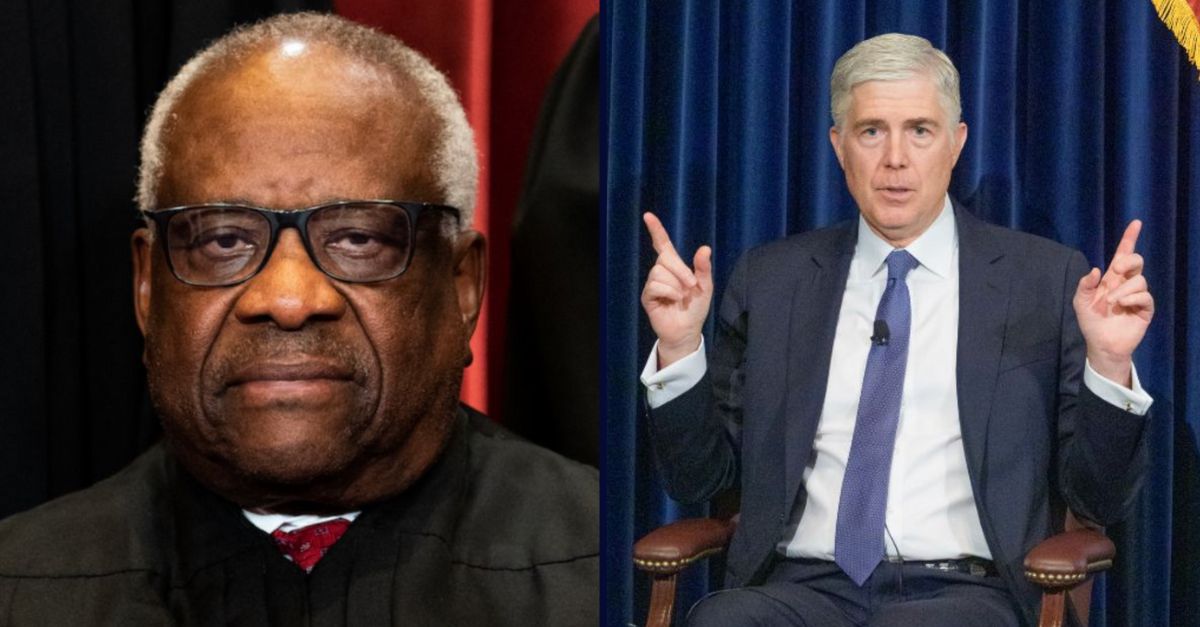
Left: Associate Justice Clarence Thomas sits during a group photo of the Justices at the Supreme Court in Washington, D.C, on April 23, 2021 (Photo by Erin Schaff/Pool/Getty Images). Right: U.S. Supreme Court Associate Justice Neil Gorsuch speaks at the Ronald Reagan Presidential Library Foundation in Simi Valley, Calif., on Thursday, Aug. 8, 2024 (AP Photo/Damian Dovarganes).
Justices Neil Gorsuch and Clarence Thomas scolded their colleagues to start the week for declining to exercise their power to "correct" the federal government's longstanding "'plenary power' over internal affairs of Native American Tribes," likening the status quo to two of the most abominable cases in Supreme Court history.
Gorsuch's writing, which Thomas joined, came at the tail end of an orders list in which the high court refused to take up the petition for a writ of certiorari brought by Quentin Veneno, Jr., against the United States.
In that petition, Veneno asked the justices to overturn the 1886 decision United States v. Kagama, to hold instead that Congress "lacks the constitutional authority to criminalize conduct between members of the same tribe that occurs on tribal land, or at least clarify the constitutional foundation on which Congress may criminalize such conduct[.]"
In Kagama, the court upheld the constitutionality of the Major Crimes Act of 1885, which gave federal courts jurisdiction over "Indians who commit" serious offenses, like murder, manslaughter, and rape, against a member of the tribe and on tribal land.
That court justified the holding by describing "Indian tribes" as "wards of the nation" who are "dependent on the United States — dependent largely for their daily food; dependent for their political rights," and who "owe no allegiance to the States, and receive from them no protection."
"Because of the local ill feeling, the people of the States where they are found are often their deadliest enemies. From their very weakness and helplessness, so largely due to the course of dealing of the federal government with them, and the treaties in which it has been promised, there arises the duty of protection, and with it the power," the 1886 opinion said, to Gorsuch's dismay. "This has always been recognized by the executive, and by Congress, and by this Court, whenever the question has arisen."
Love true crime? Sign up for our newsletter, The Law&Crime Docket, to get the latest real-life crime stories delivered right to your inbox.
Gorsuch, an unsurprising advocate on the issue, said the Kagama decision and the "plenary power" over tribal affairs that the government has asserted ever since are based on a theory rooted in "archaic prejudices" that "should make this Court blush" — like the notion that tribes are too "weak" to dole out justice for major crimes themselves.
"This Court is responsible for Kagama, and this Court holds the power to correct it. We should not shirk from the task," Gorsuch scolded, noting that the tribal courts have not been "completely displaced" but saw their "traditional sovereign tribal powers" curtailed through Kagama on the strength of "archaic colonial prejudices nowhere found in our republican Constitution and wholly antithetical to it."
Gorsuch ripped the silent majority for declining to "confront decisions, like Kagama," which "cannot be explained by the Constitution, but only by the atmosphere of their times."
"I regret that the Court declines to take up that challenge today. But whether the day of reckoning for the plenary power theory comes sooner or later, it must come. Nor is that day to be feared," the justice went on. "If this Court were to overturn Kagama, Tribes could exercise their sovereign powers to address 'major' crimes among Indians, something this Court has no business assuming they are too 'inferior' or 'weak' to do without supervision from a 'superior' people."
In a parting shot, Gorsuch likened the Kagama decision to Plessy v. Ferguson, which once upheld the constitutionality of racial segregation before it was overturned, and Korematsu v. United States, which justified internment camps for Japanese Americans during World War II.
"Doubtless, as the government stresses in its opposition to this petition, many of this Court's plenary power decisions have stood for years. But the same was once said in defense of Plessy v. Ferguson and Korematsu v. United States," Gorsuch concluded. "And, as with those cases, our plenary power decisions demand reconsideration if this Court is ever to bring coherence to the law and make good on its promise of fidelity to the Constitution."
Comments